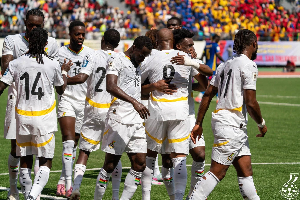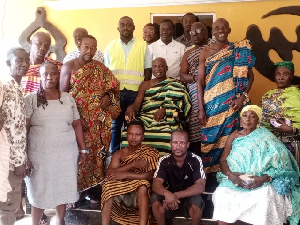By: Asare Otchere-Darko
As a Cabinet Minister for seven years and the presidential candidate for the ruling party in 2008, Nana Akufo-Addo served the nation with ad admirable level of over-and-above self-imposed ethical principles. These included, not applying for state lands and even refusing to draw on his allocation of fuel, to which every Minister (and others) was entitled. In fact, the story is told of him getting very furious to come back from a trip abroad on an official duty only to find out that his driver had gone to the Castle to claim fuel on his account.
However, rather than praising it as exemplifying the kind of leadership that Ghana needs, this has been subjected to charges of “hypocrisy”, “holier-than-thou”, “shopping your colleagues”, etc., against him. He has been put on the defensive for being extra-ethical!
Leading this charge have been two the Spokesperson for Vice President John Mahama, John Abu Jinapor. Also notable are pro-Mills newspapers such as, the Insight and Enquirer.
But, should Akufo-Addo, who did not volunteer this information even during the heat of the 2008 campaign when the acquisition of “Ga” state lands was made a major campaign issue, apologise for upholding such higher ethical standards?
The fact that he took a personal, ethical decision not to take government fuel, not to stay in a government house, not to buy state land, not to take his traveling per diem, should not be interpreted to mean that Ministers who did so acted unethically. What does that say about Ministers who are today taking free fuel? Are they then acting unethically?
In 2008, the Opposition NDC made corruption a major campaign issue. At NPP campaign strategy meetings, serious debates took place about how to deal with the corruption campaign. There were some, notably Boakye Agyarko, Jake Obestebi-Lamptey and Arthur Kennedy, who argued strongly that as a matter of campaign tactic, Nana Akufo-Addo should be bold enough to state his commitment to fighting corruption.
It was argued that he has solid credentials as an anti-corruption crusader, who practices what he preaches. In the short two and a half years that he was Attorney-General he prosecuted corruption cases, including one against a Cabinet Minister of the new Kufuor administration. No single allegation of corruption was made against him or could be fabricated against him. His hands were, figuratively, as clean as Paa Willie’s.
The truth was that his presidential campaign was being hurt by a plethora of allegations of corruption, however, farfetched many of them were; his own integrity was the best response to that. However, in the final analysis it was argued that internal party cohesion was critical. Also, after being in power for 8 years, to go on the offensive against corruption is to effectively concede that the NPP failed to deal with it – a mea culpa kind of concession to opposition propaganda.
So it transpired that the ruling party was forced by the sensitive circumstances of incumbency to downplay one of the major assets of its Presidential Candidate for 2008. What he had to say against corruption was buried in the party’s manifesto for those who had time to comb through the voluminous text to find it. Apart from Kwame Pianim who went on Kweku Sakyi-Addo’s Frontpage current affairs programme on Joy FM with paeans of praise on Nana’s incorruptibility, it was virtually a taboo subject in the 2008 campaign!
October 2010, NPP has been out of office for nearly two years. The NDC is back in office. The Founder of the NDC, Jerry John Rawlings issues a statement to say, “I have a problem with President Mills.” Why? Because President Mills, according to former President Rawlings, has refused to show strong moral leadership and has allowed to fester, “vulgar quest for materialism”, an NPP trait (according to Rawlings), “but which has sadly been endorsed by people now masquerading as diehard NDC followers”. This, he alleges, “is leading to the institutionalisation of crime and corruption” under President Mills’ ‘Better Ghana’.
Just days before this ‘boom’, the NDC was doing what it does best, coming out with reports on how “NPP grabbed” or “looted” state lands and efforts by President Mills to reclaim those “stolen” lands. It was in the middle of this issue that it was disclosed that Nana Akufo-Addo was not interested in acquiring state land and, in fact, deemed it as “unethical” for his person to have done so. A small but significant group within the NPP has received this revelation, according to reports from a predictable section of the press, with some level of discomfort.
For the pro-Mills propagandists, it comes as a big blow to a territory, which they believe their man, President Mills, should be the only leaseholder on – integrity. They say Mills is not corrupt. Evidence also supports the fact that Akufo-Addo, the Presidential Candidate for the NPP in 2012, is not corrupt.
They know that this evidence that even the lawful entitlement or privilege to either apply for state lands or draw free fuel from the Castle filling station were not exercised by Akufo-Addo puts him in a higher ethical pedestal than your “normal” Ghanaian politician. He should not be allowed to occupy that space! Let us bring him down!
Yet, one of the prime responsibilities expected of any democratic government in our struggling but hopeful nation is to build an environment of justice, fair play, rule of law, honesty, transparency and trust. This calls for a leadership that is willing and courageous enough to raise the ethical bar in the ecology of public administration.
The culture of ethical leadership is crucial to the anatomy and efficacy of pubic administration in Ghana, ergo, the quality of service it renders to citizens.
We can only create a new society of opportunities if space is created for resources to be well managed so that we can provide the social services that will assist the nation to prepare its youth for the future. We can only succeed in leapfrogging the self-built hurdles of poverty if our leaders show in deeds their commitment to fighting against corruption and those deeds must manifest in the examples they set for its smooth flow through the many estuaries of public administration.
The quality of governance and, invariably, the qualitative fast-tracking of Ghana’s development will only be enhanced when we begin to hold public servants to higher standards than are applying to them today and than even what may be applying to other professions. Historically, the lack of ethical leadership has been one of the biggest threats against Africa’s economic and political development. Unfortunately, this is a history that we seem content enough to continue reliving.
That is why we should be grateful to have leaders who, naturally, are predisposed to an ethical standard greater than the legal normative. As we may be all too well aware, such moral leadership can only be effective when it is twinned with strong leadership. It is only then that the nation can benefit from the personal ethical strengths of its singular leader at any given time – the ability and capacity of that leader to let those essential virtues he possess to be felt in the overall leadership that he and his people offer to the nation.
Although, we may have similar democratic institutions as pertain in longer-established democracies, there are, still, structural and normative differences concerning range of laws, values, norms and institutional arrangements, which combine to put a huge hole in how those same institutions operate here, arresting our development, in the process.
In Africa, it can be argued that the surge of democratisation from the 1990s has not significantly checked the potency of low ethical standards, thereby distorting both the intrinsic and extrinsic benefits that the people expect from the emerging democratic political systems in our continent. It may be a gradual process, which, nevertheless, must be graduated with utmost urgency, prioritization and political commitment.
The way of improving the ethical standards of public servants is not necessarily by the discredited crude AFRC/(P)NDC form of post-facto criminalisation and demonisation of those who merely operated by the status quo of lower existing standards but, rather, by introducing legally binding higher standards to guide future actions, backed by indiscriminate political will.
We should not dismiss personal ethics of political leaders – the kind of ethics that can determine whether a child gets educated or not; the kind of ethics that can make or break a nation’s economy. We should rather challenge such leaders to let those qualities impact positively on the nation’s culture of development. Ethical behaviour is absolutely crucial because it is critical to offsetting corruption. For a culture, like ours, built over decades in an atmosphere of degradable ethical standards, it requires strong political will, constrained only by strict adherence to the rule of law.
In the UK for instance chances of your job application at a local authority (district assembly) being successful are likely to be very low if you have a relative working with the system. On the contrary, here in Ghana the closer your relation to an employee of a public institution the closer you are likely to be in filling a vacancy that would not even have been advertised.
It does not mean that there are no rules or regulations here to minimise or avoid that crony culture. Worse still, the rules may be there. What may be lacking are firm ethical imperatives to implement them because there are no monitoring tools to be followed through by sanctions against those who disregard the rules. Thus, in some cases in Ghana, the absence of a culture of enforceable civil service or public servant laws and regulations and an unpredictable administrative displacement due to changes in political leadership only lead to lowering the bar of ethical standards.
It was therefore encouraging to read in the Chronicle of Wednesday, October 21, that the Deputy Minister of Information, Sam Okudzeto-Ablakwa was calling for a law on ethical code of public servants to be drafted by the Executive and passed by Parliament. He said this when he was reportedly praising Nana Akufo-Addo, the Presidential Candidate of the New Patriotic Party over his decision not to buy state lands under the NPP government even though Nana’s position, either as a Cabinet Member or a flagbearer, gave him optimal opportunities to acquire some of the plush state lands that were put on offer on the market by the Lands Commission.
The irony is that the Deputy Ministers was the very conductor of the propaganda of “looted” lands. But, how does this say about how we have treated the issue of land tenure in general in Ghana?
I studied Land Law or Property Law in the United Kingdom and practiced conveyancing as a trainee with a law firm in the UK some years back. The law firm was situated in Central London and I quite remember that the easiest money-making area for the firm was conveyancing – the act of transferring ownership of property from one person to another. With most of the properties that we dealt with being situated in the most expensive areas of London, the firm saw the legal fees from conveyancing, a very straightforward administrative procedure, as the dependable earner of its operations.
I then came to Ghana to study Land Law (again) under the Late Col. Lodoh and got introduced to a whole new concept. That, per the authoritative book written by B J da Rocha and Lodoh, in Ghana you are more likely to “buy litigation than land title.” Buying land in Ghana is like playing chacha (gambling). Indeed, buying land from a family, a chief or a private person is arguably the most dangerous venture one can undertake, perhaps, only second to trying to get a lucrative job as a notable opposition personnel, either in your community or on the national front.
It is for this reason that any reasonable person who cherishes his or her lawfully earned income will always prefer acquiring land from the Land Commission. In fact, state lands offer a buyer the best security of land title. That is why people apply for them – to buy land and not litigation. Land from the Land Commission comes with title deeds with which, if you like, you can risk the high interest rate of banks and borrow money to develop the land.
In truth, ever since John Mensah Sarbah, J P Brown, J W Sey and J E A Casely-Hayford and others formed the Aborigines' Rights Protection Society (ARPS) on 4th August 1897, the issue of state-controlled lands has always been a burning national one.
Indeed, it is worth noting that the ARPS, the first organised political group against colonial rule was motivated by land issues. It was formed to fight against the attempt by the British Colonial Government to introduce into Ghana what led to minority settlers in eastern and southern Africa controlling the vast majority of arable lands, reducing the inhabitants to the leftovers and rejects. This was the Crown Lands Bill of 1896 and the Lands Bill of 1897 that sought to overthrow traditional land tenure.
Again, in the 1951 Legislative Assembly, the ruling CPP decided to introduce an Ordinance that would have designated the whole of Northern Ghana state lands. It took the passionate submissions of the Minority led by J B Danquah to get the government to see the lack of wisdom in this. Yet, several lands, under the reasonable excuse of national development, were compulsorily acquired by the state. Since then it has always been the case that, first the President, and later on, the Lands Commission, has been cloaked with the authority to sell state lands.
But, when you listen to the current Government propaganda you may be forgiven to think that this was a policy that started only in 1999 and was predominantly implemented under the NPP. It is a policy from which Nkrumah’s family and Ministers benefited; Acheampong’s wife and Commissioners benefited, Rawlings’ Secretaries and Ministers benefited and Kufuor’s people saw no other way but to continue with the tradition of ‘Who Wins Acquires’.
So, if today, President Mills believes that this practice must come to an end let he not seek to do so by demonsing those who took advantage of an inherited provision and acquired land legitimately. By all means, let the law takes its natural cause if there are, prima facie, cases to answer. We are, for instance, told of a National Security report, the contents of which are for the exclusive serialisation of NDC propagandists, led by Ablakwa. It is bad for our democracy and typical of a totalitarian state when reports affecting the reputation of people are not made transparent but selectively and unfairly used to hurt political opponents.
What did the Chief Justice do wrong other than to apply for state land and an offer made to her and her accepting and going ahead to give part consideration? The current Speaker of the House, a former Supreme Court judge, lives in a house, which she legitimately acquired, at Labone. Would it be right to dig into it today, after all these years, as to how she acquired it since none of the lots in that area was initially privately-owned from the days that they were designated as state lands?
If President Mills wants to develop a higher anti-corruption package that includes formulating ethical codes to direct public and civil servants and training civil servants to respect ethical rules of administration, the rule of law and appropriate legal instruments and their implementation, let him do so.
If President Mills does not want any Minister of State or any particular group of public servants to acquire state lands let him introduce a bill to Parliament to that effect.
Fukuyama in 1995 stated, "a nation's well-being as well as its ability to compete is conditioned by a single pervasive cultural characteristic, the level of trust in society". Unethical behaviour, such as corruption, destroys public confidence and trust in an emerging democracy, such as ours.
I have no doubt that introducing greater ethical standards to guide public servants will go a long way to strengthen the connection between government and its citizen. Akufo-Addo showed a political morality that was higher than the normative perspective and standard. Yet, that was his personal moral or ethical code. We would have expected or compelled him to translate such ethics into law if he was elected as Head of State. But, he is not. Mills is and Mills says he abhors the practice, according to his actions against the NPP, but let us see this abhorrence manifested in law, not in propaganda.
The writer is the Executive Director of the Danquah Institute, a policy think tank in Accra. gabby@danquahinstitute.org
Opinions of Saturday, 23 October 2010
Columnist: Otchere-Darko, Gabby Asare














